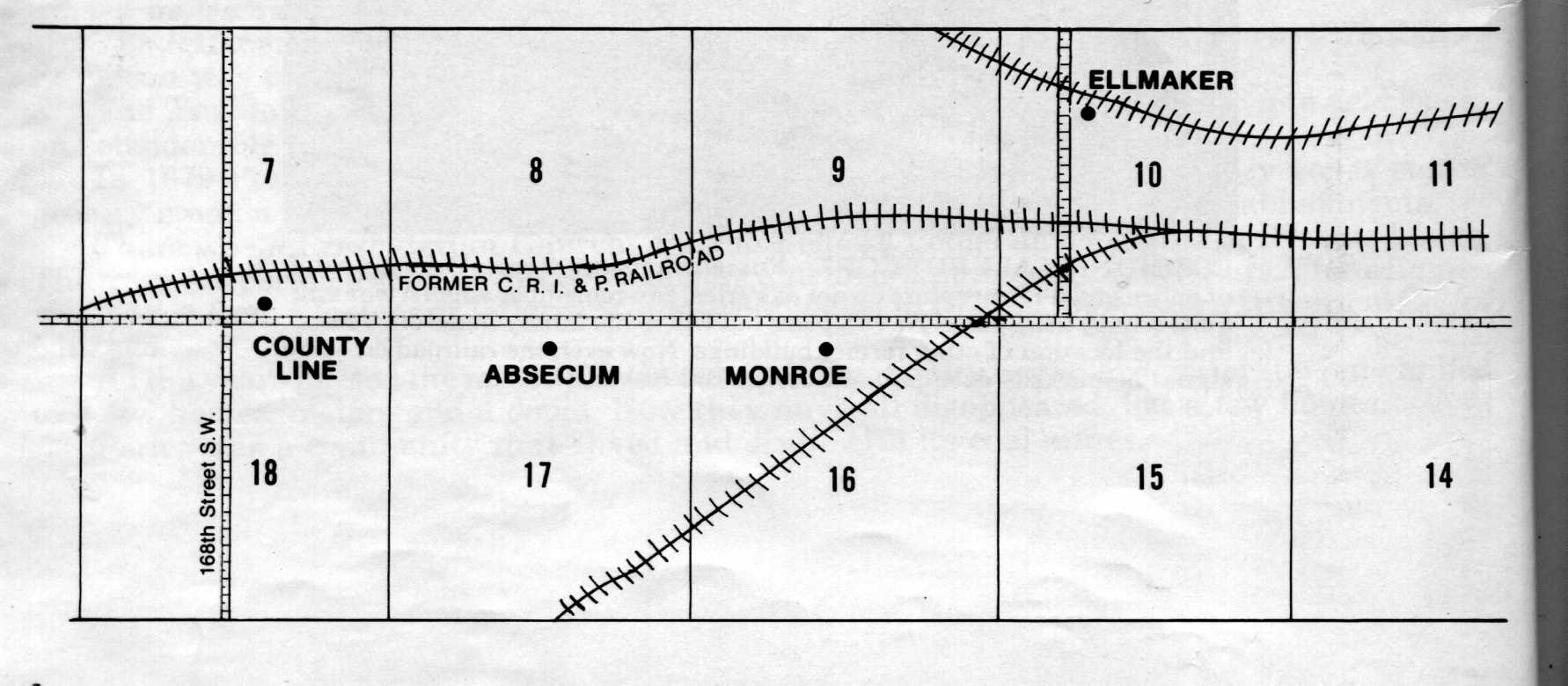 |
of Jefferson County |
 |
 |
of Jefferson County |
 |
Absecum
(Des Moines Township)
* * * * * * * * * * * * * * * *
The following story was
originally one of a number of articles in the Fairfield
Ledger which was later included into the
book Villages and Towns of Yester-year
in Jefferson County by William R. Baker.
We hereby include it on this page with the permission of the Fairfield
Ledger.
Names mentioned in this article are as follows:
Aaron
O. Edwards; Edith Pumphrey and her son Serene
The little settlement of Absecum was one of three communities which are listed as early Jefferson County towns that once were planned or existed west of Libertyville. It was settled as a trading post for the area and served as a stage coach stop. That was before the time for motorized equipment or even railroads in the area. Unlike many early settlements, it was the coming of the railroad that spelled doom for Absecum.
By 1843 a number of territorial roads had been authorized, one from Iowaville, now Selma, northeast to Iowa City and south to Lancaster, Missouri.
Also the road from Keokuk through
Birmingham and Libertyville to Agency was authorized and completed in 1847.
A town was laid out about that
time approximately five miles west of Libertyville by Aaron O. Edwards
and was named Absecum. Edwards was named postmaster and the mail was taken
to Batavia by horseback.
Edith Pumphrey and her son Serene
were among the first settlers in the Absecum area. They moved to Des Moines
Township in 1846 and erected a two-room log house.
In 1849 Serene Pumphrey operated
a freight line from Keokuk to Fort Dodge and built two more log houses
at the village of Absecum. One of the houses replaced the original log
house which was destroyed by fire.
During the Civil War history
states 106 men from Des Moines Township enlisted. There was no draft. They
enlisted voluntarily.
Since there were no soldier allotments
and a private's pay was only $11 per month, the people who remained home
considered it their duty to look after the families of the soldiers.
Considerable excitement was created
when southern sympathizers came through the community and set fire to haystacks.
The little community was a busy
place until 1859 when the stage coach route was changed. Instead of continuing
west through Libertyville and Absecum, the route was changed to a more
northern route through Fairfield and west to Batavia.
During the years while the little
village was at its peak, the owner and operator of the store served as
postmaster. The post office was lost when the stage route was changed.
Area residents had to travel to Batavia for mail service.
At one time Absecum had at least
one store, tavern and a number of houses in addition to its stage coach
stop. History states the tavern became the scene of frequent brawls and
fights. At one time 80 people called Absecum their home.
By 1865 Martin Fishel was listed
as the only resident in the town of Absecum but there were a number of
settlers in Des Moines Township.
The town of nearly 80 lots finally
disappeared. The final blow came in 1870 when the railroad arrived and
the new town of County Line just a mile west was established.
THEY'RE NOW ALL GONE -- This map shows the approximate locations of three early settlements in Jefferson County located west of Libertyville, and a station stop on the Peavine Railroad. Monroe was platted but never materialized. Absecum was a stage coach stop, and County Line "grew up" when the railroad arrived. There is no trace left of any of the settlements mentioned.

* * * * * * * * * * * * * *
The Fairfield Daily Ledger, November 7, 1957.
ABSECUM, COUNTY LINE, ONCE BUSY RURAL VILLAGES.
Little information can be found about the old
stage coach stop of Absecum, but it is apparent that County Line eventually
replaced it after the coming of the railroad. And now there is little or
nothing left of County Line. Both communities were located west of Libertyville
and played an important part in the early years of Jefferson County history.
Rumors, or bits of information still available, state that the stage coach
stop of Absecum was located about five miles west of Libertyville on what
is now the W. R. Baird farm. The house, or inn, was located on the north
side of the road where the present farm house now stands, and the large
horse barn was across the road south. The location was a regular stop for
the stage coach line from Keokuk and Fort Madison to Des Moines.
(See County Line for the remainder of the article)